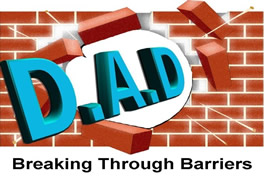
Hate Crime & HCAS
Hate Crime and Hate Crime Advocacy Service (HCAS):
Hate Crime is massively under reported as many people don’t know who to talk to or how to report incidents. The following information aims to help you understand how DAD can help and other work we do tackle Hate Crime. It also tells you how to report a hate crime and what you can expect from the police.
What is Hate Crime:
A 'hate crime' is any incident which is a criminal offence in English Law, and is perceived to be motivated by prejudice or hate against a person based on disability, race, religion, sexuality or gender. For example a physical attack, criminal damage or harassment.
A 'hate incident' does constitute a criminal offence, and again is motivated by prejudice or hate against disabled people. For example: name calling, taunting, offensive leaflet.
The victim, a witness or any other person who knows or believes a hate crime/incident has taken place can make a report too.
Reporting hate crime could bring about positive change to our community.
Many people including disabled people experience hate crimes and hate incidents on a regular basis and accept this as part of their lives despite it having a negative impact on a person’s well being and life. DAD works in partnership with the police, local authority and other voluntary sector organisations to raise awareness, increasing report and support victims.
Gordon Pybus, Chair of DAD is committed in his fight against Hate Crime “It is vitally important that disabled people should always report any hate incident or crime because what could be just name calling one day could easily escalate into a serious incident even leading to a fatality.”
Durham and Darlington Hate Crime Advocacy Service (HCAS):
In partnership with Show Racism the Red Card DAD offers victims of any type of Hate Crime access to advocacy.
The first of its kind in the country, the new Hate Crime Advocacy Service (HCAS) supports victims that experience crimes motivated by prejudice. Many of the advocates have first hand experience of Hate Crime, which people who use service tell us they value.
The service, put in place by the late Ron Hogg, Durham Police, Crime and Victims’ Commissioner, is made up of a trio of organisations that will provide advocacy support across County Durham and Darlington. The service continues to be funded by the Police Crime and Victims Commissioner Office. It supports victims to ensure their rights are safeguarded, voice is heard and they are empowered to make informed choices and decisions about their recovery. Ron said: “A crime that is motivated by hostility or prejudice towards the victim is particularly destructive and can have devastating consequences for that victim, those closest to them and the wider community.
If you are a victim of hate crime or want to refer someone (with their permission) you can access our support by calling 01325 360524 or alternatively email advocacy@darlingtondisability.org. A referral form will need to be completed; for self-referrals this can be done over the phone.
Please use this link to find out more about advocacy services we provide.
How to Report Disability Hate Crime
There are many ways to report hate crime.
- If the matter involves an attack or serious crime which needs an urgent response, ring 999
- If it is a lesser incident such as verbal abuse, ring 101
- Contact your local police directly.
- Contact Darlington Association on Disability on 01325 489 999 or email DAD for support.
Previous work DAD has undertaken to tackle Hate Crime:
Darlington Peoples Parliament:
DAD supports a self advocacy group of people with learning impairment and/or autism. Hate crime is a key focus of their work. Working alongside DAD self advocates attend groups and campaigns to raise awareness of Disability Hate Crime. Many of the member have experienced Hate Crime themselves and are passionate about combatting hate and prejudice.
‘Be Safe - Confident’ Network in Darlington with and for disabled people.
The network will act as a focal and access point for disabled people who have either experienced crime or are isolated or in danger of becoming due to a fear of crime or being unsafe in their community. The Be Safe - Be Confident project will deliver workshops and provide support to individuals. The project will be co-delivered by disabled people who have personal experience in encountering barriers in accessing the community safely.
The Be Safe - Be Confident Programme will include:
- E-safety when using social media
- Road safety, such as safe crossing points
- Using transport and taxis safely
- Using the community and what to do if you don’t feel safe.
- Use technology to keep safe when accessing the community.
- How to recognise hate crime and how to report it
- Part of the programme will be people accessing peer support from each other, through sharing experience and developing solutions and strategies together.
- The programme will also include links with local police.
Everyone should have the right to live safely and securely, and the right to live free from fear and harassment, are fundamental human rights.
How you can support us
As a local organisation we very much rely on the support of our local community. We support over 2,000 people every year to have greater choice and control and remove the barriers that disabled adults and children experience in their everyday lives. But we need YOUR help.